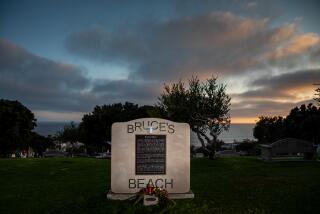Commune Agrees to Return Costa Mesa Home to Couple : Lawsuit: Husband and wife end litigation against the Piecemakers, a Christian group, in return for house. The two alleged physical and emotional intimidation.
- Share via
COSTA MESA — The Piecemakers, a Christian commune which runs a craft shop on Adams Avenue, has agreed to return a house to former members who claim that the property was taken from them through physical and emotional intimidation.
“We’re glad to be out of it,” said Seal Beach resident Marion Simonds who, with her husband, Harold, sued the commune for fraud, claiming in Orange County Superior Court that it was a “cult.” “Now all we’ve got to do is get our minds functioning like regular people,” she said.
Piecemaker leader Marie Kolasinski flatly denied the allegations Thursday. The Simondses signed their house over to the commune freely and the group decided to give it back only because “they keep harassing us and I just wanted to get rid of them,” Kolasinski said.
The Simondses’ lawsuit is the third in the last nine years against the Christian group, which began as a gathering of “hippies” in the 1960s. It has evolved into a 40-member group that operates a 12,000-square-foot store. Members live communally in six houses on Swan Drive and Stromboli Road and walk together more than a mile to work each morning.
The Simondses alleged that the commune is a cult-like community that used physical and emotional intimidation to coerce them to give up property, refrain from caring for their children and abstain from sexual relations with each other.
Kolasinski, 72, calls those accusations lies, created by people out to “crucify” the Lord. “They are children of the night out to destroy Christ,” she says. “They are motivated by vengeance, hatred, greed and jealousy. We are willing to walk with Christ, and they aren’t.”
Part of “walking with Christ,” she says, is to function as part of a larger family that shares everything, including possessions and even child-rearing tasks.
Marion Simonds, 62, joined the Piecemakers 20 years ago, which at the time wasn’t much more than a small group of quilters working out of a garage.
In 1979, Simonds and her husband, Harold, now 63 and also a former Piecemaker, moved into a four-bedroom, two-story house they had purchased on Calvert Avenue in Costa Mesa. For a few years all went well. Then the group, which by then had become communal, began moving people in with them, including outsiders seeking guidance, some of whom, the Simondses’ suit alleged, were suffering from drug addiction.
In 1986 the Simondses conveyed the ownership of their house to other Piecemaker members. Later, they signed a statement attesting that they were only the designated custodians of the property and would make no claims against it if they ever left.
Then in 1991, according to the lawsuit, Marion Simonds claimed that she was forced to resign from the fellowship after a dispute with the leadership. Her husband followed her, leaving the house in the possession of the Piecemakers.
According to Kolasinski, the property was freely given in the understanding that it was to be communal property. “If we had known how this would come out, we wouldn’t have made all those (mortgage) payments and fixed it up,” she said. All told, she said, the commune spent about $118,000 on the house. Kolasinski also said that Marion Simonds was not forced out of the commune, but left willingly.
The Simondses said in their lawsuit that the house was given away “under the mistaken impression that the (action) was for (our) benefit, when in fact the arrangement was made for the financial benefit of . . . Piecemakers.”
According to the lawsuit, Marion Simonds signed the statement waiving future claims to the property only after being “falsely imprisoned in a room for 40 minutes with locked doors” and subjected to “violent verbal abuse” by commune members.
But after two days in court last month, the group agreed to give back the house in exchange for dropping the lawsuit which, among other things, claims that the former commune members were inflicted with emotional distress by being “systematically harassed, degraded, subject to mental and physical abuse including blows with fists and kicks”--all of which the commune denies.
Kolasinski declined to reveal details of the group’s finances but said the Piecemakers is not a tax-exempt organization.
An earlier court dispute with unhappy former members resulted in a $60,000 judgment against the group in 1983. In that lawsuit, one of the original Piecemaker members alleged that when she tried to leave the commune, other members “taunted her from her lawn and called her on the telephone to pressure her to resubmit to the group’s authority and control.”
A child-custody suit filed the same year contained declarations by several experts and former commune members attesting to the cult-like characteristics of the group. And in a recent book entitled “Churches that Abuse,” author Ronald M. Enroth, a professor of sociology at Westmont College in Santa Barbara, devotes an entire chapter to the Piecemakers.
“I have reached the tentative conclusion,” Enroth said in a declaration for the 1983 child-custody case, “that the group has some similarities to Peoples Temple . . . is unstable, irrational . . . and poses a potential for harm to its members. . . .”
That characterization and the lawsuits have not adversely affected the atmosphere at the Piecemakers Country Store where, on a recent afternoon, crowds of shoppers perused the rows of shelves containing everything from brightly colored quilts to dainty Christmas baskets.
“All we do is teach the Gospel,” Kolasinski said in dismissing her detractors. “They are perverting the truth to justify their own sins.”
More to Read
Sign up for Essential California
The most important California stories and recommendations in your inbox every morning.
You may occasionally receive promotional content from the Los Angeles Times.













